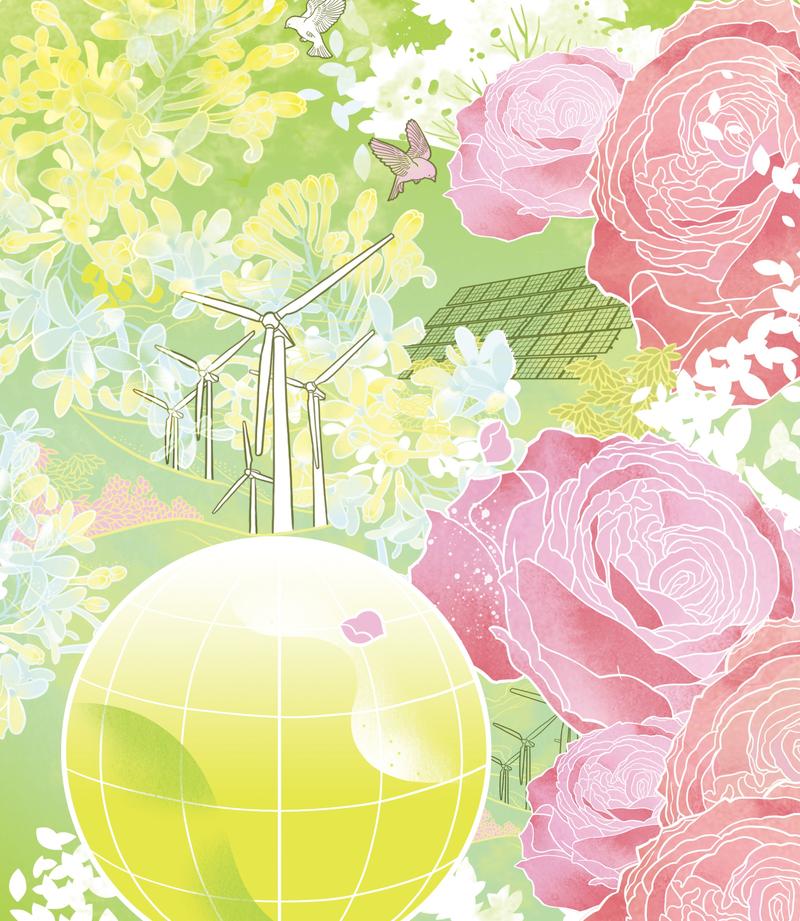Editor's Note: Many countries have announced their plan to cut carbon emissions to fight climate change and better protect the environment. Senior editor with China Daily share his views.
 (LI MIN / CHINA DAILY)
(LI MIN / CHINA DAILY)
"How can one own stars?"
"Whose are they?" the businessman asked peevishly.
"I don't know. They don't belong to anyone."
"In which case, they are mine, because I was the first person to think of it."
"Is that sufficient?"
"Of course it is. When you find a diamond that belongs to nobody, it is yours…When you are the first to have an idea, you take out a patent on it: it is yours. And I own the stars because nobody else before me thought of owning them."
This conversation between the Little Prince and the businessman from Antoine de Saint-Exupery's Little Prince sums up the fate of the Earth. The goal of business magnates and corporations is simple: multiplying their wealth by exploiting resources, especially natural resources, and labor.
And the goal of multiplying their wealth is to become richer.
Why do they want to become richer?
For an answer, we can return to the Little Prince. Before reaching the point of the abovementioned conversation, the Little Prince asks the businessman: "And what is the point of being rich?" The latter replies: "It enables me to buy other stars, if anybody can find any."
This accumulation of wealth is an unending phenomenon even if that means the world and its resources be damned. And this damning disdain for everything this planet has to offer, from the green mountains, blue seas, hurtling rivers and lilting ocean waves to the glistening glaciers, lush forests, agile wildlife, colorful and not-so colorful birds, slithering, hopping and buzzing insects, and silently lying minerals in the womb of the Earth is the bane of humanity.
Ever since the Industrial Revolution, the most rich and powerful of our species have been devouring everything this planet has to offer, everything that is needed to keep this planet habitable for humans. They make promises to do the needful to maintain the equilibrium of nature, pretend to respect the needs of fellow human beings, especially the poor and the needy, but continue with their marauding ways.
One such example, one of millions of such examples, was highlighted in an article published in The Guardian on Thursday. It says: "The oil industry knew at least 50 years ago that air pollution from burning fossil fuels posed serious risks to human health, only to spend decades aggressively lobbying against clean air regulations, a trove of internal documents seen by the Guardian reveal."
The documents include internal memos and reports of the oil industry, which say that "pollutants could lodge deep in the lungs and be 'real villains in health effects', and… that its own workers may be experiencing birth defects among their children". Yet the oil and gas companies kept creating doubts about the studies linking the burning of fossil fuels to an array of health problems that claim millions of lives across the world every year. Apparently, they could do so because they managed to convince many that climate change was just scaremongering, if not a hoax. And those that reluctantly acknowledged the reality claimed the cost of addressing the crisis was so high that it would increase the price of almost every commodity, including basic necessities.
Yet the fact is that, climate change raises the cost of capital in climate-vulnerable countries and threatens debt sustainability, and weakens a sovereign's standing. And climate change-induced natural disasters can have a devastating impact on natural capital, and mitigation and adaptation policies can have far-reaching fiscal consequences, even destabilizing the financial sector, which in turn can affect global trade and capital flows.
Some economies have realized the urgency of fighting climate change, and announced their climate goals. China is one of them. It has pledged to take all necessary steps to ensure its carbon emissions peak before 2030 and it achieves carbon neutrality before 2060. Other major economies, including the European Union, the United States and Britain have vowed to realize carbon neutrality by 2050.
Yet some skeptics suggest it is more worthwhile to continue business as usual and develop advanced technologies to offset the impact of climate change, because it is almost impossible to shift industries' reliance from fossil fuels to clean energy and economic development is more important that environmental protection for human survival.
That China does not buy into that argument is evident from the low-carbon, green development policy it has been following for the past years. Accordingly, President Xi Jinping, addressing the 75th session of the UN General Assembly in September 2020, said China would strive to achieve carbon neutrality before 2060. And speaking at the Climate Ambition Summit via video link in December, Xi announced that by 2030, China aims to lower its carbon dioxide emissions per unit of GDP by over 65 percent from the 2005 level and increase the share of non-fossil fuels in primary energy consumption to around 25 percent.
And to achieve that goal, China will reduce energy consumption per unit of GDP and carbon dioxide emissions per unit of GDP in 2021 by 13.5 percent and 18 percent, respectively, according to this year's Government Work Report, which also vowed that the government will draw up an action plan for peaking carbon emissions before 2030.
The need for the world, especially some Western countries, now is to adopt similar measures, because by targeting China on the pretext of strengthening the global battle against climate change, they will be behaving like the businessman in the Little Prince, who says:"… I write down the number of stars on a piece of paper. And then I put it in a drawer and lock it with a key."
That is to say they will continue their pretentious attempt to secure the world's future.
The author is an editor with China Daily.


